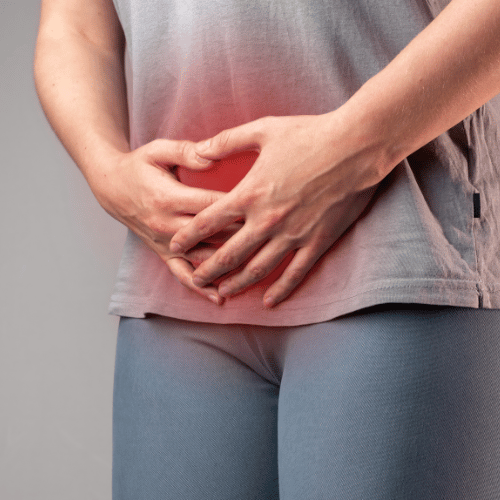
PCOS: Diagnosis, Research & Management
Polycystic Ovary Syndrome is a common endocrine disorder that affects people with ovaries, typically during their reproductive years.
Women Health > Vaginal Infections

Find Out More


Our vaginal infection test screens for the main types of vaginitis: thrush, bacterial vaginosis, Chlamydia, Gonorrhoea, and Syphilis.
Please schedule an appointment with a member of our team at the earliest sign of anything unusual. We always offer the option of consulting with female doctors if preferred. Feel free to contact us directly or use our convenient online booking system.

A vaginal infection refers to any infection that affects the vagina. These infections can be caused by various organisms such as bacteria, fungi, or viruses. Common types of vaginal infections include:
Bacterial Vaginosis: In many cases, the only symptom will be a change in your discharge. BV discharge is white or greyish in colour and has a strong fishy smell, which may be more intense after sexual intercourse. BV does not usually cause itching or irritation.
Thrush: Symptoms include thin and watery, or thick and white (‘cottage cheese’) discharge. Other symptoms include intense itchiness and pain around the vagina. The discharge from thrush does not have a strong odour but may smell yeasty (like bread or beer).
Trichomoniasis: Symptoms may include frothy, yellow-green vaginal discharge with a strong odour, genital itching or redness, discomfort during urination, and pain during intercourse.
Vaginitis: Some symptoms that often accompany vaginitis include abnormal discharge, irritation, itching, mid-cycle bleeding, or dyspareunia (painful intercourse). Bacterial vaginitis can be caused by thrush, bacterial vaginosis, or chemical irritation from soaps, spermicides, or douching.


Treatment for vaginal infections depends on the cause. Fungal infections are treated with antifungal creams and tablets, while bacterial infections require antibiotics.
To improve vaginitis and maintain vaginal health, keep your genital area clean and dry with a warm bath and plain, unperfumed soap. Avoid douching, as it can worsen symptoms by removing healthy bacteria.
Also, avoid using feminine hygiene products like sprays or deodorants, use pads instead of tampons during infection, and wear loose-fitting cotton underwear. Consider going without underwear at night for added comfort.
Bacterial infections of the vagina are usually caused by factors that upset the balance of the good bacteria normally present in the vagina. The bacteria found in a healthy vagina are there to protect and maintain its health. The main functions of healthy vaginal bacteria are:
Use our online booking engine or book your test by giving us a call.
On the online booking engine select the “appointment type” you need.
You will be seen by one of our friendly doctors or trained clinicians.

Avoid using any products that could alter the natural environment of the vagina. This includes avoiding douching, using vaginal deodorants, or applying any medicated creams or ointments unless prescribed by a doctor.

The testing process involves a physical examination and the collection of a sample from the vagina. This can be done using a swab, which is gently inserted into the vagina to collect cells or discharge for analysis. The process is quick and usually causes minimal discomfort. The doctor will also discuss any symptoms you’re experiencing to better understand your condition.

The laboratory analysis will determine if there is an infection and, if so, identify its nature, whether it’s bacterial, fungal, or related to sexually transmitted infections (STIs) such as chlamydia, gonorrhea, or syphilis. You will be notified of the results and your doctor will discuss appropriate treatment options based on the findings.
Incorporated
in 1998
Experienced doctors & a professional team
Registration
not needed
Up-to-date with the latest treatments & testing
Strictly
confidential
Experienced doctors & a professional team
Affordable private
health care
Transparent fee structure with no hidden charges
We work with experienced consultants & healthcare professionals who have received positive feedback from our patients, and with whom we have established long-term relationships.
Latest Episode
Tune in to our podcast to explore the world of healthcare and learn from distinguished special guests. We cover everything from preventative measures to cutting-edge treatments so that you can stay informed and up-to-date on health-related things.

Polycystic Ovary Syndrome is a common endocrine disorder that affects people with ovaries, typically during their reproductive years.

Menopause is a natural biological process that marks the end of a woman’s reproductive years, typically occurring between ages 45

Learn about vaginal discharge: its role, what’s normal, and when to be concerned. Stay informed for optimal health.
Subscribe for latest updates & news


From same-day private GP and blood test appointments to visa medicals, a sexual and reproductive health clinic, and preventative health screenings, we are here to help.
Contact Us
Accepted Insurance Companies






Please note that Walk-in Clinic is a private medical centre & not an NHS service. Harley Walk-in Clinic Ltd company registration no. 07472804